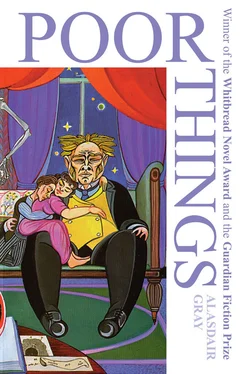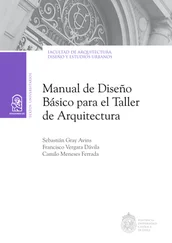Why did my second husband describe Godwin as a monster whose appearance made babies scream, nursemaids flee and horses shy? God was a big sad-looking man, but so careful and alert and unforcing in all his movements that animals, small people, hurt and lonely people, all women (I repeat and emphasize it) ALL WOMEN AT FIRST SIGHT felt safe and at peace with him. He asked why I wanted the operation Dr. Prickett was arranging. I explained. He questioned my explanation. I told him about my childhood, my schooling, my marriage. After a long pause he said gently, “My dear, you have been badly treated all your life by selfish, greedy, silly men. Yet they are not to blame. They too were horribly educated. Dr. Prickett really believes the operation the General wants for you will help you. It cannot. Have nothing to do with it. I will tell Prickett what I have just told you. He will not accept my opinion, but you have a right to know what it is.”
I wept with grief and gratitude, knowing what he said was true. I had always felt it was true, but could not know it until I heard it said. I cried out to him, “They will drive me mad if I stay here. Where can I go?”
“If you have no friend to shelter you, no money and no experience of earning it,” he said, “it will be suicide to leave your husband. I am sorry. I cannot help you.”
I was inspired — by his kindness. I rushed across to the chair where he sat, knelt between his legs and raised my clasped hands to the level of his face .
“If!” I demanded, “one night several weeks from now, or months or years from now, a homeless desperate friendless woman comes to your home in Scotland and begs for shelter — a woman you have once treated kindly — could you turn her away?”
“I could not,” he said, sighing and looking to the ceiling .
“That is all I need to know,” I said, standing up, “apart from your address which I suppose I can find in a British medical directory.”
“Yes,” he murmured, standing up also, “but leave me alone if possible, Lady Blessington.”
“Good-bye,” I said, shaking his hand and nodding .
Was ever surgeon in this manner wooed? Was ever surgeon in this manner won?
The last possible moment came two months later, and I was not pregnant, and had never considered leaping from a bridge when I arrived in Glasgow and took a cab to Park Circus and the house of the big dogs. I had just learned that the husband who would not give me a child was about to have one by a servant ten years my junior. Baxter received me without a single question. He led me to the room where Mrs. Dinwiddie sat (she must then have been forty-five years old, for he was thirty) and said, “Mother, this badly treated lady has come to us for a rest, and will stay here until she can afford a home of her own. Treat her as my sister.”
Yes, 18 Park Circus had one thing in common with 29 Porchester Terrace. A master there had got a son by a servant: a woman he did not marry. But Godwin loved and acknowledged his mother, though she had not his father’s name. The visitors Baxter most liked would be invited to drink tea with “my mother — Mrs. Dinwiddie”. Tea with her was no cosy formality. A keen-minded woman with a strong sense of humour, she could hold her end in a conversation with anyone.
“What are you inventing now, Sir William?” she would ask the scientist who had been knighted for making the Atlantic Cable work, “and will it undo the damage of your last big job?”—for she pretended to think wars and the weather had worsened since the development of the telegraph. My own mother had made me Mancunian. The nuns had made me French. The friendship and conversation of Mrs. Dinwiddie gave me the voice and manners of an unprejudiced, straightforward Scotswoman. Colleagues who knew nothing of my early years still amuse me sometimes by saying how SCOTTISH I am.
God could be honest about his unmarried mother because he was a bachelor with an unearned income. He could not be honest about sheltering the runaway wife of an English Baronet and Great British General. To save us from awkward questions he invented the South American married cousins, their death in a train crash and their amnesic daughter Bella Baxter, who was me. This was a good excuse for teaching me the important things I had never been taught, but he would not let me forget anything I had already learned .
“Forget nothing,” he said; “your worst experiences in Manchester and Lausanne and Porchester Terrace will enlarge your mind if you remember them with intelligent interest. They will stop you thinking clearly if you cannot.”
“I cannot!” I cried. “My fingers have ached scrubbing filthy clothes in a washtub of freezing water: they have ached playing Beethoven’s Für Elise nineteen times without stopping on the piano because the teacher made me start again whenever I hit a wrong note. My head has ached because my dad cracked my skull with his fist; it has ached because I had to memorize passages of Fénelon’s Télémaque, surely the dullest book ever. These things cannot be remembered intelligently — they belong to different worlds, God, and nothing connects them but pain I want to forget.”
“No, Bella. They seem in different worlds because you met them far apart, but see me open the hinged front of this big doll’s house and fold it back. Look into all the rooms. This is a type of house you will find by thousands in British cities, by hundreds in the towns, and tens in the villages. It could be Porchester Terrace or this house — my house. The servants live mostly in the basement and attics: the coldest and most crowded floors with the smallest rooms. Their body heat, while they sleep, keeps their employers in the central floors more snug. This little female doll in the kitchen is a scullery-maid who will also do rough laundry work, scrubbing and mangling the clothes. She will have plenty of hot water to use if her master or mistress is generous, and may not be overworked if the servants set over her are kind, but we live in an age when thrift and hard competition are proclaimed as the foundations of the state, so if she is meanly and cruelly used nobody will remark upon it. Now look into the parlour on the first floor. Here is a piano with another little female doll sitting at it. If her dress and hair-style were changed for the scullery-maid’s she might be the same girl, but that will not happen. She is probably trying to play Beethoven’s Für Elise without a wrong note — her parents want her one day to attract a rich husband who will use her as a social ornament and breeder of his children. Tell me, Bella, what the scullery-maid and the master’s daughter have in common, apart from their similar ages and bodies and this house.”
“Both are used by other people,” I said. “They are allowed to decide nothing for themselves.”
“You see?” cried Baxter delightedly. “You know that at once because you remember your early education. Never forget it, Bella. Most people in England, and Scotland too, are taught not to know it at all — are taught to be tools.”
Yes, Baxter taught freedom by surrounding me with toys I had never known as a child and by showing me how to work instruments (then called philosophical instruments) which his father had used to teach him. I cannot describe the heavenly feelings of power I enjoyed as I manipulated the terrestrial and celestial globes, the zoetrope, microscope, galvanic battery, camera obscura, regular solids and Napier’s bones. Fine manipulations came easily to me because of my mother’s needlework and the convent piano training. I also had botany, zoology, travel and history books with engraved and coloured pictures to brood over. Duncan Wedderburn, God’s legal friend, sometimes took me out to theatres because God could not do that — he had a horror of crowds. I loved the theatre — even the high-kicking pantomime chorus-row struck me as carefree and happy! But I loved Shakespeare most. So I started reading him at home, starting with Lamb’s Tales from Shakespeare, then the plays themselves. In the library (led on by the illustrations) I also discovered Andersen’s Fairy Tales, Alice in Wonderland and The Arabian Nights (this last in a French translation which included the erotic passages). For a while Baxter got a tutor for me, Miss MacTavish. She did not last. I wanted nobody but God to teach me. With him learning was a surprising meal; with her it was a discipline. Around this time I first met young Archie McCandless .
Читать дальше












